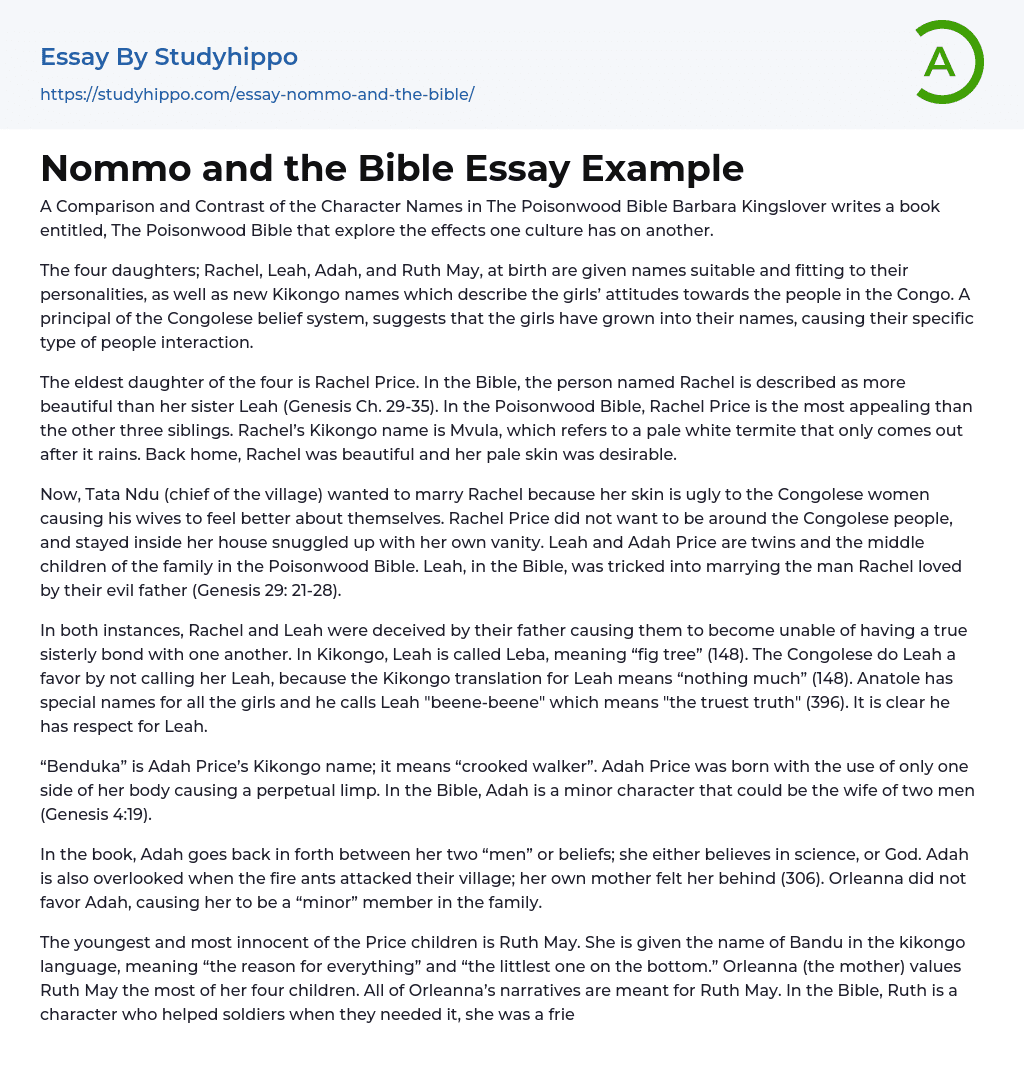A Comparison and Contrast of the Character Names in The Poisonwood Bible Barbara Kingslover writes a book entitled, The Poisonwood Bible that explore the effects one culture has on another.
The four daughters; Rachel, Leah, Adah, and Ruth May, at birth are given names suitable and fitting to their personalities, as well as new Kikongo names which describe the girls’ attitudes towards the people in the Congo. A principal of the Congolese belief system, suggests that the girls have grown into their names, causing their specific type of people interaction.
The eldest daughter of the four is Rachel Price. In the Bible, the person named Rachel is described as more beautiful than her sister Leah (Genesis Ch. 29-35). In the Poisonwood Bible
..., Rachel Price is the most appealing than the other three siblings. Rachel’s Kikongo name is Mvula, which refers to a pale white termite that only comes out after it rains. Back home, Rachel was beautiful and her pale skin was desirable.
Now, Tata Ndu (chief of the village) wanted to marry Rachel because her skin is ugly to the Congolese women causing his wives to feel better about themselves. Rachel Price did not want to be around the Congolese people, and stayed inside her house snuggled up with her own vanity. Leah and Adah Price are twins and the middle children of the family in the Poisonwood Bible. Leah, in the Bible, was tricked into marrying the man Rachel loved by their evil father (Genesis 29: 21-28).
In both instances, Rachel and Leah were deceived by their father causing them to become unable of havin
a true sisterly bond with one another. In Kikongo, Leah is called Leba, meaning “fig tree” (148). The Congolese do Leah a favor by not calling her Leah, because the Kikongo translation for Leah means “nothing much” (148). Anatole has special names for all the girls and he calls Leah "beene-beene" which means "the truest truth" (396). It is clear he has respect for Leah.
“Benduka” is Adah Price’s Kikongo name; it means “crooked walker”. Adah Price was born with the use of only one side of her body causing a perpetual limp. In the Bible, Adah is a minor character that could be the wife of two men (Genesis 4:19).
In the book, Adah goes back in forth between her two “men” or beliefs; she either believes in science, or God. Adah is also overlooked when the fire ants attacked their village; her own mother felt her behind (306). Orleanna did not favor Adah, causing her to be a “minor” member in the family.
The youngest and most innocent of the Price children is Ruth May. She is given the name of Bandu in the kikongo language, meaning “the reason for everything” and “the littlest one on the bottom.” Orleanna (the mother) values Ruth May the most of her four children. All of Orleanna’s narratives are meant for Ruth May. In the Bible, Ruth is a character who helped soldiers when they needed it, she was a friend. The translation of the word Ruth in Hebrew means “companion” (“Origin and Meaning of Baby Names").
The word ruth in English, mean grief; for Orleanna, she felt much grief when Ruth May
died. An entire book of the Bible describes Ruth, and an entire character dedicates what she says to Ruth May. The Kikongo word "nommo" is "the force that makes things live as what they are" (209); it is "a song, a poem, a scream, a prayer, a name"(210). It refers to the belief that naming something gives it its nature - a man is a man because that is what he is named, whereas a rabbit is not a man because that is not what he is named.
Nommo says you do not have a life until you are named; your name makes you who you are. Would Rachel Price be less vain and beautiful if her name were not Rachel Rebekkah? Nommo says, yes, she would be a different person. Kingslover’s approach to identifying the characters in The Poisonwood Bible, maintains the focus on who each person is and who they are meant to be. The names give us hints as to what each person’s personality will be. Also, the names can allude to biblical references that help define what the character’s relationships with others are. Nommo and their birth names combined adequately describe each girl and their actions.
- Book Summary essays
- Metaphor essays
- Reader essays
- Rhyme essays
- Literary devices essays
- Villain essays
- Books essays
- Genre essays
- Literary Criticism essays
- Writer essays
- Protagonist essays
- Simile essays
- Poem essays
- Book Report essays
- Book Review essays
- Greek Mythology essays
- Plot essays
- Tragic Hero essays
- Coming of Age essays
- Play essays
- Rhetoric essays
- Rhetorical Question essays
- Translation essays
- Understanding essays
- Reason essays
- Character essays
- Letter essays
- American Literature essays
- Literature Review essays
- Utopia essays
- Poetry Analysis essays
- Dante's Inferno essays
- Between The World and Me essays
- Incidents in The Life of a Slave Girl essays
- Flowers for Algernon essays
- Myth essays
- Everyday Use essays
- Boo Radley essays
- Genesis essays
- Richard iii essays
- Alice in Wonderland essays
- On the road essays
- Ozymandias essays
- The Nightingale essays
- Holden Caulfield essays
- Animal Farm essays
- 1984 essays
- A Hanging essays
- Shooting An Elephant essays
- A Tale Of Two Cities essays




